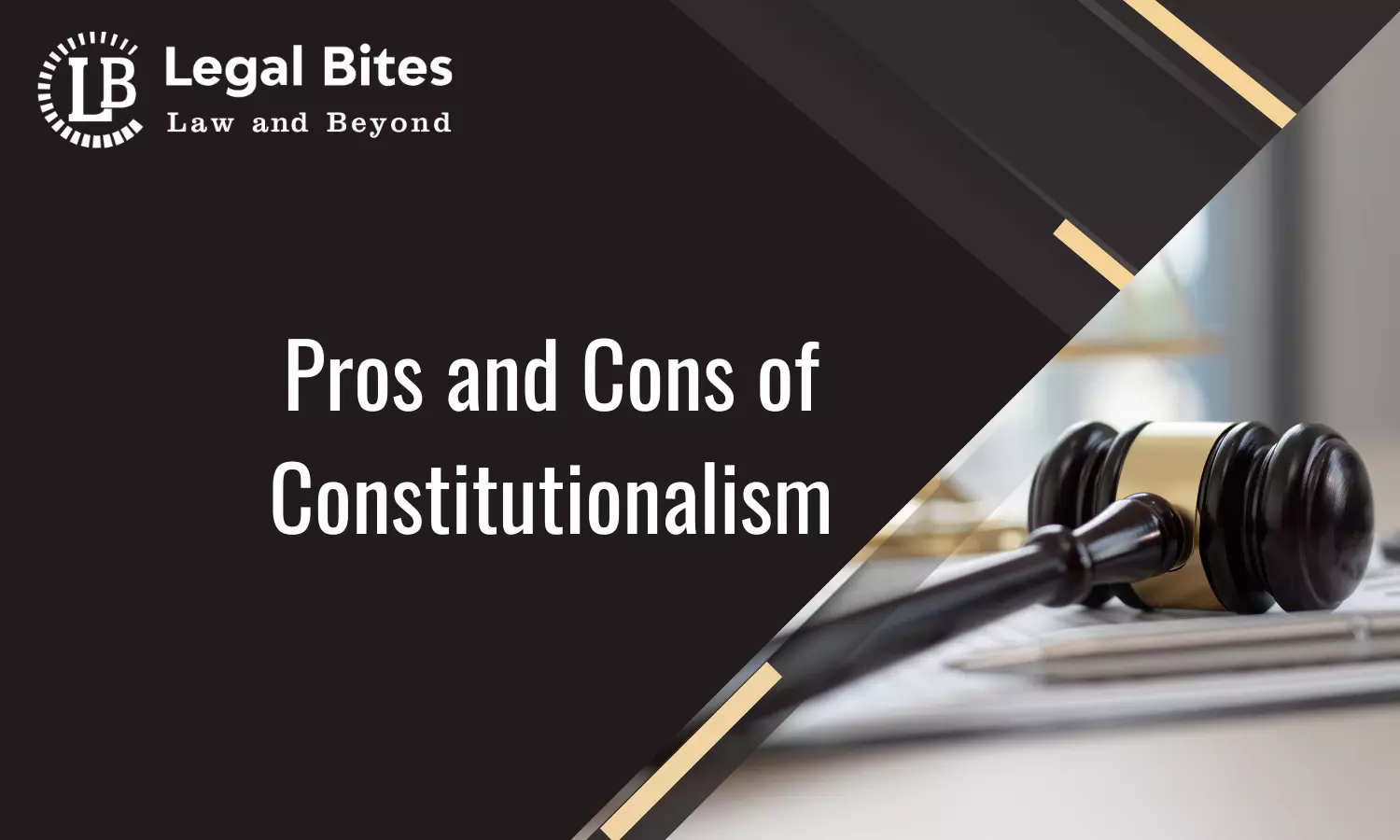Pros and Cons of Constitutionalism
The article 'Pros and Cons of Constitutionalism' deals with the concept of Constitutionalism and its positive and negative aspects.

The article 'Pros and Cons of Constitutionalism' deals with the concept of Constitutionalism and its positive and negative aspects. Constitutionalism is a doctrine that manages the legality of government acts. It indicates something much more significant than the notion of legality, which calls for an official activity to adhere to strict legal regulations. Constitutionalism examines whether a government's actions are lawful and whether officials carry out their public duties in accordance with laws that have been pre-fixed or pre-determined in advance.
Introduction
As per the concept of Constitutionalism, a body of laws or a constitution determines the power of a government. A democratic government is given legitimacy through the doctrine of Constitutionalism. Hence, Constitutionalism refers to the limitations placed on a government by a Constitution. The core idea of a constitution is to set laws that establish, organize, and specify the limited power or authority of government.
A written Constitution is not Constitutionalism. John Locke, who is a political theorist, and the founders of the American republic are often associated with the idea of Constitutionalism. Separation of powers, judicial oversight, and government accountability are some of the fundamental ideas that are developed under the concept of Constitutionalism. Governmental power can and should be legally regulated, and adhering to these restrictions is essential to maintaining the legitimacy of the Government.
In India, No law can be passed that infringes fundamental rights under Article 13. Hence, for the Indian State, fundamental rights serve as negative covenants. The ideas of “Due Process of Law,” “Procedure Set by Law,” "Checks and Balances,” “Rule of Law,” and even the process for amending the Constitution under Article 368 all serve to limit the power of the government. In the case of Rameshwar Prasad v. Union of India, Writ Petition (Civil) 257 of 2005, the Supreme Court recognized the concept of constitutionalism. The SC observed that
“Constitutionalism or constitutional system of government abhors absolutism- it is premised on the rule of law in which subjective satisfaction is substituted by objectivity provided by the provisions of the constitution itself.”
In Coehlo v. State of Tamil Nadu, AIR 2007 SC 861, the court held that constitutionalism is a legal principle that requires control over the exercise of governmental power to ensure that the democratic principles on which the government is formed shall be destroyed.
Principles of Constitutionalism
Separation of Powers
The legislative, executive and judicial branches of government make up the three branches of the separation of powers. In addition to preventing the concentration of power, this establishes a system of checks and balances. Given that the Constitution itself contains this division of powers, it becomes a powerful tool for upholding constitutionalism.
Responsibility and Accountable Government
In a democracy, representatives are elected to serve the interests of the public. In this sense, voters have a right to expect transparency and responses from their government. As a result, when the electorate's expectations aren't fulfilled, the government's right to rule is withdrawn by being ousted from office.
Popular Sovereignty
According to the idea of popular sovereignty, the populace grants legitimacy to the government. No business entity or person is allowed to use any authority that doesn't directly come from them. Even though there is a specific sovereign entity with governing authority, the nation itself has the final say in matters of sovereignty. Such a sovereign body derives its authority from the general populace.
Rule of Law
The rule of law consists of three components, First, “Equality before the law” i.e. Equal adherence to the legal system of the territory, as applied by common law, by all citizens, rich or poor, high or low, second “importance of individual’s Right” and the third one is “Absence of arbitrary power” i.e. No one is to be punished unless a specific legal breach is proven to have occurred before a court of law legitimately. The fundamental tenet of constitutionalism is that the state (including its representatives) is not unconstrained in what it can do or how it can do it. They must adhere to the procedures and restrictions on their authority outlined in the Indian Constitution. For instance, List II of the seventh schedule places a restriction on the centre, prohibiting it from passing laws on a select number of topics that are solely the province of the state. Hence, constitutionalism depends on the application of the law.
Independent Judiciary
The judiciary or courts are the most significant element for guaranteeing constitutionalism because they are instrumental in limiting the authority of the state. The court established the doctrine in Kesavananda Bharati v. State of Kerala and others (1973) 4 SCC 225. In the case, the court limited the parliament's ability to change the constitution by outlining the basic structure of the constitution (basic principles). The court ruled that while the parliament has the authority to amend the constitution, including fundamental rights, it cannot change the core foundation of the constitution. Consequently, maintaining constitutionalism requires a judiciary that is unbiased and independent.
Individual Rights
The courts have expanded the scope of individual rights' application and effect in addition to protecting them. The judiciary in India assists in upholding these rights.
Civilian Control of the Military
According to constitutionalism, the military should be under the supervision of a civilian administration to prevent military interference in democratic decision-making or military coup attempts.
Police Accountability
Constitutionalism puts a strong emphasis on the idea that law enforcement will protect people's rights, freedoms, and dignity.
Pros of Constitutionalism
Constitutionalism serves as a check on the arbitrary use of force and power abuse by the state. Constitutionalism protects people's rights to life and liberty and is essential for a democratic democracy. The Rule of Law is protected by constitutionalism, which is essential to democracies everywhere. As it permits crucial checks and balances on the disproportionate use of governmental power, constitutionalism supports good governance and democracy in a state. Constitutionalism makes sure a country doesn't develop into an elitist state.
It is crucial, particularly in developing nations where the abuse of authority by the government and its representatives is typical. Constitutionalism makes sure that every person has the right to human dignity and that the state is founded on the Rule of Law. Totalitarianism and authoritarianism are prevented by constitutionalism.
Cons of Constitutionalism
Some critics contend that constitutionalism restricts and limits the state's authority. It leaves no room for morality or common sense because constitutionalism establishes a system of rules and laws that control the government. Although the country's supreme legislation, the constitution, is adaptable, it is nonetheless challenging to update and amend. The idea of constitutionalism as a whole falls apart since it is difficult to modify the constitution. Constitutional concepts like police accountability and the idea of checks and balances are merely pipe dreams.
Conclusion
All healthy democracies have a constitutionalism concept that has been around for a while. But, governments have learnt over time to use the resources of the state for their gain rather than that of the people. The government has tainted the policymaking process, whose main goal is the welfare of the greater public, by allowing backdoor access to corporate interests in decision-making. Governmental accountability is increased through the concept of checks and balances. The concept of constitutionalism represents a proper implementation of democracy and constitutional government, both of which are essential for achieving progress for all.
References
[1] What are the Pros and Cons of Constitutionalism?, Available Here
[2] Positives of constitutionalism in India, Available Here
[3] What is Constitutionalism? , Available Here
Important Links
Law Library: Notes and Study Material for LLB, LLM, Judiciary, and Entrance Exams

